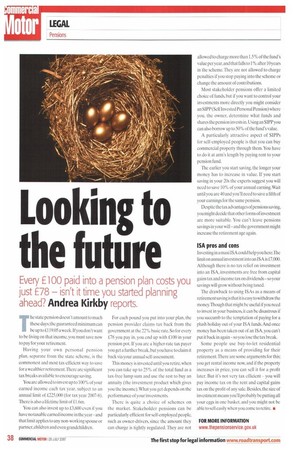Looking to the future
Page 38

If you've noticed an error in this article please click here to report it so we can fix it.
Every £100 paid into a pension plan costs you just £78 — isn't it time you started planning
ahead? Andrea Kirkby reports.
The state pension doesn't amount to much these days; the guaranteed minimum can be up to £119.05 a week. If you don't want lobe living on that income, you must save now to pay for your retirement.
Having your own personal pension plan, separate from the state scheme, is the commonest and most tax-efficient way to save fora wealthier retirement.There are significant tax breaks available to encourage saving.
You are allowed to invest up to 100% of your earned income each tax year, subject to an annual limit of £225,I)00 (for tax year 2007-8). There is also a lifetime limit of £1 km.
You can also invest up to £3,600 even if you have no taxable earned income in the year and that limit applies to any non-working spouse or partner, children and even grandchildren. For each pound you put into your plan, the pension provider claims tax back from the government at the 22% basic rate. So for every £78 you pay in, you end up with £100 in your pension pot. If you are a higher-rate tax payer you get a further break, but you have to claim it back via your annual self-assessment.
This money is invested until you retire, when you can take up to 25% of the total fund as a tax-free lump sum and use the rest to buy an annuity (the investment product which gives you the income) What you get depends on the performance of your investments.
There is quite a choice of schemes on the market. Stakeholder pensions can be particularly efficient for self-employed people, such as owner-drivers, since the amount they can charge is tightly regulated. They are not allowed to charge more than 1.5% of the fund's value peryear,and that falls to 1% after 10 years in the scheme. They are not allowed to charge penalties if you stop paying into the scheme or change the amount of contributions.
Most stakeholder pensions offer a limited choice of funds, but if you want to control your investments more directly you might consider an SIPP (Self Invested Personal Pension) where you, the owner, determine what funds and shares the pension invests in. Using an SIPP you can also borrow up to 50% of the fund's value.
A particularly attractive aspect of SIPPs for self-employed people is that you can buy commercial property through them. You have to do it at arm's length by paying rent to your pension fund.
The earlier you start saving, the longer your money has to increase in value. If you start saving in your 20s the experts suggest you will need to save 10% of your annual earning. Wait until you are 40 and you'll need to save a fifth of your earnings for the same pension.
Despite the tax advantages of pensions saving, you might decide that other forms of investment are more suitable. You can't leave pensions savings in your will— and the government might increase the retirement age again.
ISA pros and cons
Investing in a maxi ISA could help you here.The limit on annual investment into an ISA is £7,000. Although there is no tax relief on investment into an ISA, investments are free from capital gains tax and income tax on dividends—so your savings will grow without being taxed.
The drawback to using ISAs as a means of retirement saving is that it is easy to withdraw the money Though that might be useful if you need to invest in your business, it can be disastrous if you succumb to the temptation of paying for a plush holiday out of your ISA funds.And once money has been taken out of an ISA, you can't put it back in again—so you lose the tax break.
Some people use buy-to-let residential property as a means of providing for their retirement.There are some arguments for this; you get rental income now, and if the property increases in price, you can sell it for a profit later. But it's not very tax efficient — you will pay income tax on the rent and capital gains tax on the profit of any sale. Besides, the size of investment means you'll probably be putting all your eggs in one basket, and you might not be able to sell easily when you come to retire. •
























































































































































































